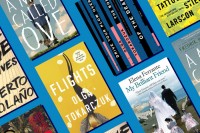
Will Translated Fiction Ever Really Break Through?
vulture.com – Tuesday May 7, 2019

In May 2018, Olga Tokarczuk and her translator Jennifer Croft won the Man Booker International Prize for Flights, a novel that was published in Poland in 2007. Drive Your Plow Over the Bones of the Dead, for which Tokarczuk is a Booker finalist again this year, was translated a bit faster; it only took a decade. One of the biggest stars in translation of this century, Roberto Bolaño, author of 2666 and The Savage Detectives, fared no better. Back in 2003, when New Directions put out his first translated book, By Night in Chile, Bolaño had already passed away; he was a famous writer by then, at least in Spanish.
The process of literary translation takes time, obviously, but there’s something else at play when it takes a decade or more for incredibly renowned authors to reach our shores. This is part of a much larger problem, frequently referred to as the “3 percent problem” by publishers of translation (like myself), which should be troublesome to anyone who believes the world is better off when cultures are in conversation with one another.

More About Agents
By G. Miki Hayden
Instructor at Writer's Digest University online and private writing coach
firstwriter.com – Friday May 3, 2019

Are you talented? Are you lucky? For you, then, agents count. Read below.
Agent Location
Does it help if your agent is in Manhattan, if she’s agoraphobic and never leaves the house?
My opinion is an agent with a Manhattan address is probably more impressive (even if she doesn’t lunch), than an agent who lives in Butte, Montana. Of course most authors who live all over the place won’t understand the cachet of the city address or 212 area code (though many Jane-come-latelys or folks who’ve moved may find themselves stuck with a 646 telephone code).

The problem with authors writing fan fiction
theweek.com – Friday April 26, 2019

The internet was abuzz a few weeks ago after author J.K. Rowling revealed that the characters Albus Dumbledore and Gellert Grindelwald had an "incredibly intense" and "passionate" relationship with a "sexual dimension." Though this unsolicited declaration was especially bizarre and meme-worthy, it was only the latest of several years worth of post-series changes to the Potterverse. Hermione is (possibly) black, Nagini is an Asian woman, wizards don't have indoor plumbing, etc. Since the final book of the original Harry Potter series was published in 2007, Rowling's website Pottermore has become a fountainhead for excess information about the wizarding world. Conveniently, much of that information has fallen into the category of diversity, as if Rowling thought she could retroactively add queer wizards and wizards of color and pretend they were there all along. Perhaps, like the horcruxes, we just didn't know they existed until the end.

5 Things I Learned Launching a Little Literary Magazine
bookriot.com – Wednesday April 24, 2019

Little literary magazines come and go. Shi’r was here one decade, gone another. So too Tin House, Souffles, The Partisan Review, and Black Clock. Indeed, author Nick Ripatrazone went so far as to write last year that “Literary Magazines are Born to Die.” He didn’t mean it as a bad thing, but rather that we should recognize they have a life cycle and pay tribute to our literary ancestors.
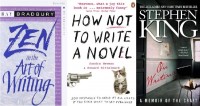
3 Great and Inspiring Books About Writing
culturedvultures.com – Tuesday April 23, 2019

How is your writing going at the moment? I’ll be honest and say that mine personally could have been better this last month or so. I started the year strongly and have reached a bit of a dip. The thing that always helps me to get out of a slump is to get inspired by someone else, be it asking a friend who is busy with their words if I can read for them, or reading a book about writing by someone who seriously knows what they are talking about. Here are three great books on the subject, all of which have helped me when I’ve been feeling a bit down in the writing dumps. They’re the ones I always go back to time and again, whenever I need that jolt.
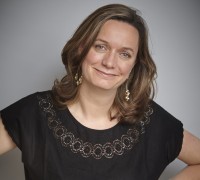
Best-selling author Harriet Evans reveals her technique for penning hit novels
womanandhome.com – Thursday April 11, 2019

We ask Harriet Evans about her journey to becoming a best-selling author, find out why she proudly displays Golden Girls DVDs, and reveal tantalising details about her latest book...
Harriet Evans is no newbie to the world of writing. In fact, she’s written a whopping 12 books over the course of her career.
Writing it seems is in her blood. Her father was formally an editor at Hodder, the publishing house behind some of the most successful and prolific writers, such as Jodie Picoult and John Grisham.

Writing a first novel is like wandering out into an unclear, inhospitable landscape
irishtimes.com – Monday April 8, 2019

In September 2008, I left my job as a structural engineer to return to university to study fine art. I had also begun creative writing classes at the Irish Writers Centre under the Texan novelist, Greg Baxter, a then unpublished author and a complete unknown to me.
His classes consisted of reading and discussing the work of great writers. We’d submit writing and a week later we’d receive our text back, decimated with strikethroughs, edits, suggestions; and at the end of each exercise there was always a substantial note of criticism and encouragement. I ended up doing three 10-week classes in short form fiction and nonfiction. It exposed me to writers I’d not heard of before. My reading up till then consisted of some classics and whatever had been given good reviews in the broadsheets. I don’t remember Greg giving much by way of general advice throughout this time, other than that he insisted whatever we submitted was in no way to be planned out or plotted ahead. The openended-ness at the heart of this request at first sat uneasily with me. My habits of thought up till then had been, naturally enough, predominantly deductive.
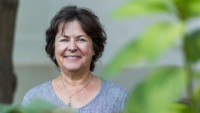
Turning Pages: The joys of writers' retreats
smh.com.au – Friday April 5, 2019

I've always been a bit sceptical about writers' retreats. They sound so self-indulgent. All that food and wine and yoga and wellbeing in gorgeous surroundings. Aren't you supposed to just get on with it, in your garret or at the kitchen table, surrounded by people? It was good enough for Jane Austen, why isn't it good enough for you?
Yet these retreats are flourishing, and they seem to get more and more lavish and luxurious. Perhaps the first haven for Australian writers was Eleanor Dark's house, Varuna, in the Blue Mountains, and it's still going strong. You can win a residency or pay for your stay, and you can either work away quietly or get feedback from editors and publishers through the various mentoring programs on offer.
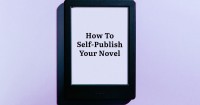
How to self-publish your novel
theverge.com – Monday April 1, 2019

Until recently, if you were a writer who had a novel or other work, there was essentially a single path to follow: you tried to find an agent who liked your writing, and who would be able to sell it to a publisher. The process could take months or years — assuming you were able to get on that merry-go-round at all.
David Gaughran, author of Let’s Get Digital and other books about self-publishing, tried that route when he wrote his first novel about 11 years ago. It was an exasperating experience.
“I spent about 18 months querying every agent that I could find in the English-language world and didn’t really get anywhere,” Gaughran says. He was frustrated enough that he thought about giving up. “But then I started looking at self-publishing.”
Since then, self-publishing has become far more than a last-ditch alternative to traditional publishing — it’s a choice that many authors are making from the starting line. But while it’s not all that hard to put out an ebook these days, finding an audience takes a lot more than simply uploading your manuscript and clicking publish: it means going through the entire publishing process on your own, from editing to artwork to marketing, putting your book’s success entirely in your own hands.

Pen Names: Don’t worry, you can deposit the check
By G. Miki Hayden
Instructor at Writer's Digest University online and private writing coach
firstwriter.com – Monday April 1, 2019

One of the topics I see some jawboning about is whether and why to use/not use a pen name (aka a nom de plume). Since the topic seems to fascinate, and many folks before they’ve even written the book seek out a name to write it under, I thought the subject was worth some air time.
Get the free newsletter | Submit a news item or article | Get Writers' News for your website





